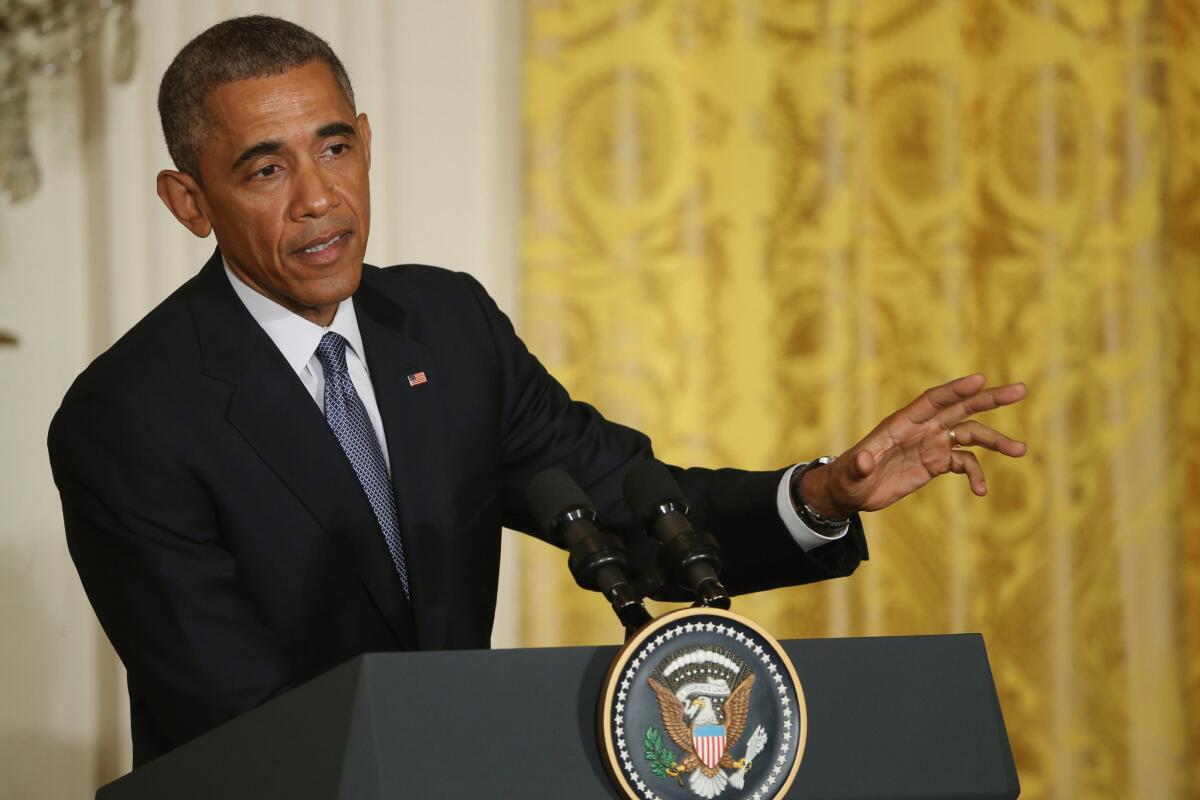Obama tells Congress that more sanctions on Iran could lead to war

President Obama vowed Friday to stop any attempt by Congress to ratchet up sanctions against Iran while the U.S. and partner countries negotiate over its nuclear program.
Obama also warned lawmakers that they would be responsible if a sanctions drive were to lead to the collapse of the ongoing talks. A diplomatic failure could even lead to a war, which “Congress will have to own” if it passes a new sanctions bill, he said.
“It will jeopardize the possibility of providing a diplomatic solution to one of the most difficult and long-lasting national security problems we have faced in a very long time,” Obama said in a news conference with British Prime Minister David Cameron. “My main message to Congress at this point is, ‘Just hold your fire.’”
Obama’s language and forceful tone marked a sharp intensification of the White House effort to preserve the prospect of a deal with Iran and signaled deep anxieties about Congress’ plans.
The presence of Cameron, who acknowledged that he has taken the unusual step of contacting U.S. senators about the possible sanctions, illustrated the high-stakes nature of Obama’s tough talk. Many countries are watching closely to see whether the discussions fail, which many fear could lead to Iran building a nuclear bomb that could further destabilize the Middle East.
The charge that Congress is risking war is an explosive one aimed at lawmakers who mostly contend they are increasing the chance that diplomacy will succeed by building economic pressure on Tehran.
“This is where I have a fundamental disagreement with the president,” said Sen. Robert Menendez (D-N.J.), noting that sanctions would be set to go into effect only if the discussions produce no agreement.
Iran and six powers — the United States, Britain, France, Germany, Russia and China — have been negotiating under the terms of an interim agreement worked out in November 2013. It gave Iran limited relief from sanctions in exchange for a halt to some of its most worrisome nuclear activities.
Iran and the world powers missed deadlines twice last year to complete a deal, and critics of the diplomatic effort contend that these failures show Iran is unwilling to yield and that more sanctions are required.
But administration officials argue that the clamor for tougher sanctions stands to disrupt the negotiations.
For Obama, the next months of the nuclear talks are about keeping options alive, even if the odds are long, on an issue he sees as significant to his own legacy. He noted that the likelihood of diplomatic success on the nuclear negotiations stands at less than 50-50.
“I don’t think anybody’s optimistic that we’re going to fix this problem any time soon,” said Jon Alterman, Middle East specialist at the Center for Strategic and International Studies. “But we’re much better working together to capitalize on the moment rather than fumbling the moment with political grandstanding.”
Administration officials argue that new sanctions would be seen as a gesture of bad faith not only by Iranian officials, but also by the other world powers at the bargaining table and many other countries around the world. The United States, in this view, would end up with the blame for the collapse of the talks.
In trying to make that case, Obama got an assist from Cameron.
He said he spoke to a couple of senators “to make the point as a country that stands alongside America in these vital negotiations” that additional sanctions won’t help the talks succeed.
Yet the strategy of bringing Cameron into the lobbying effort could backfire, said Nile Gardiner of the conservative Heritage Foundation think tank.
“The degree to which David Cameron has been roped into selling Obama’s message is striking, and it’s a risky move,” Gardiner said. “There could be a backlash against what could be seen as an intervention by a foreign leader in a U.S. debate.”
Some lawmakers were likely to be unmoved by Cameron’s argument.
The end of negotiations is the whole point of such congressional action, Sen. Tom Cotton, an Arkansas Republican, has said. “It is very much an intended consequence — a feature, not a bug, so to speak,” Cotton said in a recent address to a conservative policy summit.
Senate Republicans say they are moving toward a sanctions vote this month or next and may also vote soon to restrict the Obama administration’s ability to strike any kind of pact with Iran over its nuclear program.
Sen. Bob Corker (R-Tenn.), new chairman of the Foreign Relations Committee, argued this week that giving Congress approval power over the deal would be comparable to the current process required if the U.S. arranges to sell nuclear products to friendly countries.
“Should Congress not have the same ability to weigh in on an agreement that’s far more important?” Corker asked.
U.S. negotiators met with Iranian officials Friday in Geneva to try to advance the negotiations, and Secretary of State John F. Kerry also met in Paris with Iranian Foreign Minister Mohammad Javad Zarif.
In the news conference, Obama insisted that he would accept only a deal that ensured Iran would be prevented from developing a bomb, noting the U.S. refusal to accept the terms offered by Tehran so far.
“I’ve already shown myself willing to walk away from a bad deal,” Obama said.
Times staff writers Paul Richter and Michael A. Memoli contributed to this report.
For more White House coverage, follow @cparsons on Twitter.
More to Read
Sign up for Essential California
The most important California stories and recommendations in your inbox every morning.
You may occasionally receive promotional content from the Los Angeles Times.










